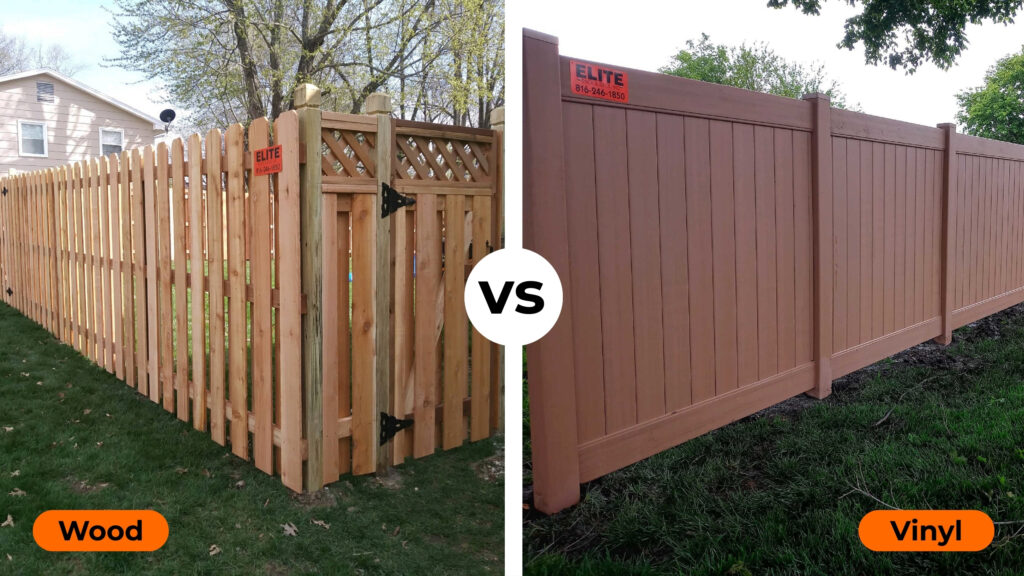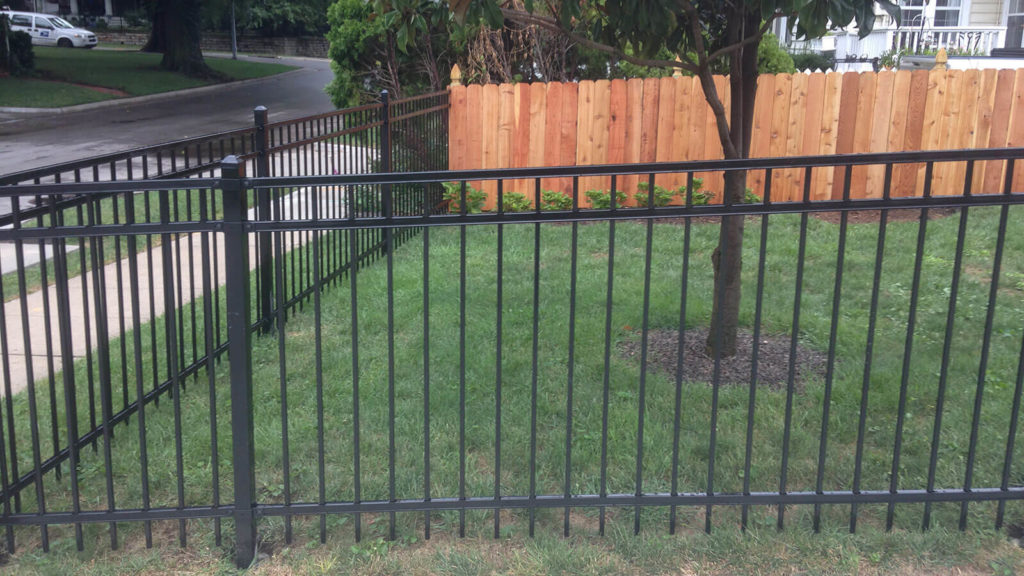
Wood Fence vs. Vinyl Fence: Which is Better for Your Home?
Choosing the right fence for your property is a significant decision that impacts aesthetics, privacy, and long-term value. While countless options exist, the debate often comes down to two popular choices: wood and vinyl. Each material offers distinct advantages and disadvantages. As professionals in home improvement, we understand the nuances that separate these two options. This guide will help you understand the differences between a wood and a vinyl fence, empowering you to make an informed decision for your home.
The Fundamental Materials: Natural vs. Synthetic
At a fundamental level, the choice between a wood fence and a vinyl fence is a choice between a natural, traditional material and a modern, synthetic one.
- Wood: A classic, natural material that has been used for fencing for centuries. Wood fences offer a timeless, organic look that can be stained or painted to match a home’s aesthetic. They are often valued for their rustic charm and traditional appeal.
- Vinyl: Made from synthetic materials, primarily PVC (polyvinyl chloride). Vinyl fencing is manufactured to be durable, low-maintenance, and consistent in appearance. It is a modern alternative that provides a clean, uniform look.
Pros and Cons of Wood vs. Vinyl Fencing
Wood Fencing:
- Pros: Lower initial cost, natural appearance, highly customizable, easy to repair specific sections, and a traditional look.
- Cons: Requires significant maintenance (sealing, staining, painting), susceptible to rot, pests, warping, and splintering. Has a shorter lifespan if not properly cared for.
Vinyl Fencing:
- Pros: Extremely low maintenance (no painting or staining), long lifespan, durable and resistant to rot, pests, and moisture. Clean and consistent appearance.
- Cons: Higher initial cost, can crack in extreme cold, not as easy to repair individual sections, and cannot be painted or stained.
Vinyl vs Wood Fencing: Considering the Investment
The financial aspect is a major factor in the decision-making process, both in terms of initial cost and long-term value.
Is Wood or Vinyl Fence Cheaper?
In most cases, wood is the cheaper option for initial installation. The material cost for wood, especially common varieties like pine or cedar, is significantly lower than for vinyl. Labor costs can also be less as wood is a more common material for installers to work with.
Is Vinyl or Wood More Affordable for a Privacy Fence?
When comparing the cost of a full privacy fence, the same rule generally applies: the privacy fence cost for wood vs. vinyl will show wood as the more affordable option upfront. However, this is only the beginning of the financial picture.
Do Vinyl Fences Last Longer Than Wood?
Yes, vinyl fences last significantly longer than wood fences. While a well-maintained wood fence might last 15-20 years, a vinyl fence can easily last 30 years or more with minimal upkeep. When you factor in the long-term cost of maintenance for a wood fence (e.g., staining, sealing, painting, and replacing warped boards), the total cost of ownership over 20 years can be very similar, and in some cases, vinyl can become the more economical choice in the long run.
Durability, Strength, and Maintenance
Beyond cost, the physical properties of the materials are key to understanding their performance.
Is Vinyl Fence Stronger Than Wood?
While wood can be stronger in certain applications (like a solid post for a gate), vinyl fencing is typically more flexible and resistant to impacts than wood. It will bend rather than snap, making it a good choice for areas with high winds. In very cold temperatures, however, vinyl can become brittle and more susceptible to cracking on impact.
Do Vinyl Fence Posts Need Wood Inside?
Yes, it is standard practice to use wood or metal inserts inside vinyl fence posts for structural stability, particularly for gate posts or corner posts that bear more weight and stress. The vinyl itself provides the aesthetic, weather-resistant exterior, but a treated wood post or a metal post inserted inside provides the necessary strength to keep the fence straight and sturdy. This is a common method that professionals use to ensure the fence’s integrity.
Maintenance and Upkeep: Vinyl vs. Wood Fencing
This is where vinyl truly shines. A wood fence requires a commitment to ongoing maintenance every few years, including:
- Washing
- Sanding
- Staining or painting
- Checking for rot, pests, or splintering
- Replacing boards
A vinyl fence, by contrast, only needs to be occasionally washed with a hose and mild soap to remove dirt and grime. It does not require painting, staining, or sealing.
Aesthetics and Practical Applications
The final look of your fence is important, as is its function beyond just providing a barrier.
Vinyl vs. Wood Privacy Fence: Which is Better?
For a privacy fence, both materials are effective. Wood offers a traditional, classic look that can be very private, but gaps can appear over time as the wood shrinks. Vinyl provides a seamless, uniform appearance with no gaps, making it excellent for complete privacy.
- For noise reduction, vinyl or wood fences are not a primary solution. Neither material is designed to be soundproof. While a solid privacy fence can block some noise, neither will offer significant sound reduction on its own.
Can I Get a Vinyl Fence That Looks Like Wood?
The beauty of vinyl today is that it has evolved. Manufacturers now offer vinyl fences that look like wood, complete with realistic wood grain textures and colors. This allows you to get the aesthetic of a natural wood fence with the low-maintenance benefits of vinyl.
Installation and Customization Between Fences
The flexibility of wood and vinyl materials also impacts how they can be installed and adapted.
Can You Mix Vinyl and Wood Fences?
Yes, you can absolutely mix vinyl and wood fences. This is a creative way to use each material to its best advantage. For example, you might have a vinyl fence for the main perimeter of your yard and use wood for a custom gate or a section that needs a different aesthetic.
Can You Attach a Vinyl Fence to Wood Posts?
Yes, you can attach a vinyl fence to wood posts using specialized hardware. This is a common solution, especially for homeowners who want the look of vinyl with the structural integrity of existing wood posts.
Can You Convert a Wood Fence to Vinyl?
No, you cannot simply convert a wood fence to a vinyl fence. The materials and installation methods are entirely different. Converting would require a complete tear-down of the existing wood fence and a new installation of a vinyl one. Attempting to attach vinyl panels to existing wood framework is not recommended as it will not provide the necessary stability.
Your Dream Fence is Just a Call Away
The final decision between a wood and vinyl fence depends on your priorities. If you value a lower upfront cost, a classic look, and a hands-on approach to maintenance, installing a wood fence may be your best bet. If you prioritize long-term durability, a clean look, and minimal maintenance, a vinyl fence is likely the better investment.
Ready to install a new fence for your home? As a family-owned company in the local Missouri area, Elite Fence can help you find the perfect wood or vinyl fence for your property. Contact us today for a free quote!

